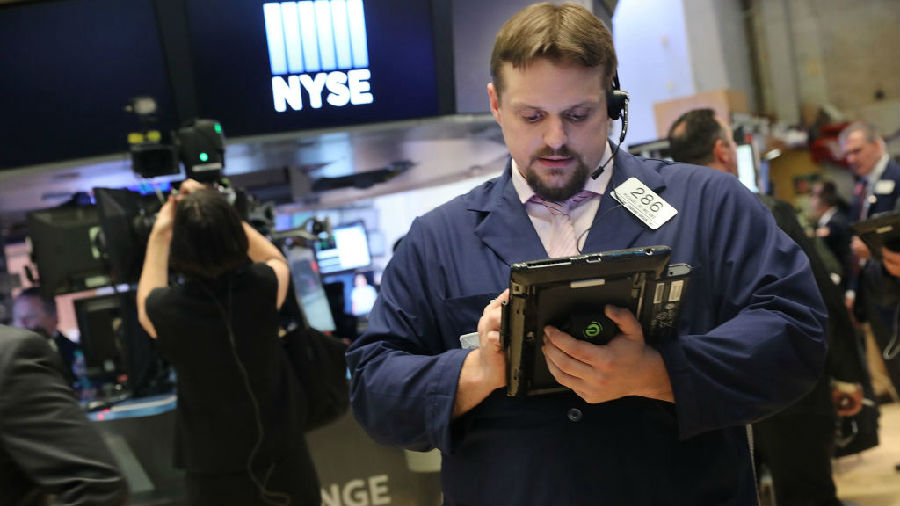The US market in public share listings is ailing; over the past two decades, the number of initial offerings has plunged 45 per cent. That is one reason Barack Obama, then president, passed the Jumpstart Our Business Startups Act, which allowed listing companies worth less than $1bn to keep their finances private for longer.
美国首次公开发行(IPO)市场出现了问题;过去20年里,IPO数量暴跌了45%。这也是时任美国总统巴拉克?奥巴马(Barack Obama)签署《创业企业融资法案》(Jumpstart Our Business Startups,简称JOBS)的一个原因——该法案允许价值不足10亿美元的拟上市公司延长其财务数据的保密时间。
The Trump administration recently loosened those standards to include any company of any size, the idea being that less onerous reporting standards would encourage more public offerings.
特朗普(Trump)政府最近进一步放松了标准,把所有规模的公司都包括进来,想法是为繁琐的财务报告标准减负能鼓励更多的企业上市。
Jay Clayton, US Securities and Exchange Commission chair, positioned it as a big win for the little guy. The extent, he said, to which companies are eschewing public markets in the US makes most individual investors unable to benefit from their growth.
美国证交会(SEC)主席杰伊?克莱顿(Jay Clayton)认为这是散户的重大胜利。他说,越来越多的公司回避在美国上市,让大多数散户投资者无法受益于它们的发展。
It is a laudable goal, not only when viewed through the lens of wealth sharing but also because companies that go public create jobs faster than those that remain private.
这是一个值得称赞的目标,不仅是从财富分享的角度来看是这样,而且还因为上市公司创造就业的速度要超过那些未上市公司。
Yet the logic of loosening standards to increase the number of companies seeking to list is wrong. It is true that the regulatory burden for public companies has risen, in part because of greater reporting demands following scandals such as Enron and the financial crisis.
然而,通过放松标准来增加拟上市公司数量的逻辑是错误的。的确,上市公司的监管负担有所增加,这在一定程度上是在安然(Enron)等丑闻和金融危机之后会计报告要求提升所致。
But by and large, companies are not eschewing public markets because of what happens during the IPO process, but because of what happens before and after. An increase in private funding sources, looser patent enforcement, added pressure for short-term results and a fraying social safety net that stymies risk-taking have reduced willingness to seek an IPO.
但总的来说,公司逃避上市,问题并不出在IPO期间,而出在IPO之前与之后。私人融资来源增加,专利执法力度减弱,短期业绩压力上升,以及捉襟见肘、抑制冒险的社保体系,都降低了企业上市的意愿。
As Steve Case, chief executive of Revolution, a Washington-based venture capital group, and founder of AOL, recently pointed out, “companies used to go public to actually raise operating capital”.
正如华盛顿风险资本集团Revolution首席执行官、美国在线(AOL)创始人史蒂夫?凯斯(Steve Case)最近指出的那样,“公司过去上市真的是为了筹集运营资本”。
Now the goal of an IPO is all too often for investors to “exit” with as high a valuation as possible. Many sources of private money, from hedge funds and private equity firms to sovereign wealth funds, are eager for a cut of a hot sector. Facebook raised $2.2bn in private equity funding over seven years ahead of its IPO.
如今,对投资者来说,IPO的目标往往是获得尽可能高的估值“退出”。从对冲基金到私人股本公司和主权财富基金,许多私人资金来源都渴望从热门行业中分得一杯羹。Facebook在上市前的7年里从私人股本资金那里筹得了22亿美元。
Uber has raised five times that as well as more than $3bn in debt funding thanks to low interest rates.
优步(Uber)经历了5轮融资,此外还得益于低利率,通过债务融资逾30亿美元。
This means that, even as the number of IPOs has decreased, the average size of companies that go public has increased dramatically. This has the effect of keeping more money in private hands: even large asset managers know they may not receive all the shares they want from a hot IPO in a constrained market, so they buy in early, acquiring a stake in the pre-public phase. A winner-takes-all dynamic is created in which a small number of institutional investors get in early on hot new companies, and fewer such companies need to come to market.
这意味着,即便IPO数量减少了,上市公司的平均体量却大幅增加。结果是让更多的钱保留在私人手中:即便大型资产管理公司也知道,它们在一个受限制的市场中可能拿不到热门IPO公司的所有股份,因此它们提早买入,在公司上市前收购股份。由此造成了一种“赢家通吃”的局面:少数几家机构投资者早早获得热门上市公司的股份,而需要上市融资的此类公司越来越少。
Other reasons lie behind the dramatic decline in IPOs, such as weaker patent protection over the past 10 years, which makes it tougher for start-ups to protect their intellectual property and thus garner investment.
IPO数量大幅下降还有其他原因,比如过去10年专利保护力度减弱,这让初创企业更难保护自己的知识产权,从而获得投资。
Macro issues such as decreasing public spending and a threadbare social security system play a role. The lack of single payer healthcare, for example, makes it more difficult for Americans to leave their jobs to start companies. A 2008 Harvard study estimated 11m workers were caught in “job lock” because they were dependent on employer-based healthcare.
公共支出不断下降和社保体系日显陈腐等宏观问题也是原因之一。例如,缺少全民医保制度让美国人更难离职创业。哈佛大学(Harvard)在2008年的一项研究估计,有1100万人由于依赖雇主缴纳医保而卡在现有工作里。
An increase in student debt, thanks in part to lower state funding of college costs, has held back would-be entrepreneurs. “With that [$1.4tn] student debt burden on their shoulders, many millennials don’t feel empowered to take the risk of striking out on their own,” says David Jolley, Americas growth markets leader at EY, the accounting firm.
学生债务增长——部分归因于政府削减了对大学开销的资助——阻止了未来的创业家。会计公司安永(EY)的美国增长市场主管大卫?乔利(David Jolley)表示:“背负着(1.4万亿美元的)学生债务负担,许多千禧一代人觉得没有勇气冒险创业。”
What is to be done? In lieu of a debt jubilee or healthcare reform, pushing back against short-term market pressure is a good start. Making share buybacks illegal, for example, as they were before 1982, would be a step in the right direction, as would limiting the amount of performance pay that can be awarded in stock options. These give business leaders major incentives to think more about the short rather than long term.
那么应该怎么办?应该从抵制短期市场压力做起,而不是债务豁免或者医疗改革。例如,就像1982年以前那样,让股份回购不合法是向正确方向迈出的一步,限制以期权形式获得的绩效薪酬额也是正确之举。这些做法让企业高管更有动力考虑短期而非长期利益。
Chief executives and investors such as Jamie Dimon, Larry Fink and Warren Buffett have spoken out about the need to shift standards of corporate governance so that boards can focus less on “tick the box” legal demands and more on management, strategy and risk evaluation. That would probably require major tort reform. One of the reasons boards spend so much time on such issues is the amount of corporate litigation in the US.
杰米?戴蒙(Jamie Dimon)、拉里?芬克(Larry Fink)和沃伦?巴菲特(Warren Buffett)等首席执行官和投资者们公开表示有必要改变企业治理标准,从而让董事会少去在意那些只需“打勾”的法律要求,而更多地关注管理、战略和风险评估。这可能需要对民事侵权法进行重大改革。董事会之所以花这么多时间关注此类事情,原因之一就是美国的企业诉讼非常多。

There is lower hanging fruit, namely focusing on the types of businesses in the US that need funding. Most of them are not those that would list but those that are making ends meet via founders’ personal credit cards and loans from community banks, which have been unfairly constrained by Dodd-Frank rules. Community banks represent 13 per cent of banking industry assets but 43 per cent of all small business funding.
还有一种更容易获得成功的做法,即聚焦于美国需要融资的企业种类。其中大多数公司不会去上市,而是通过创始人的个人信用卡和社区银行贷款来实现收支平衡,后者不公平地受到《多德-弗兰克法案》(Dodd-Frank Act)的限制。社区银行仅占银行业总资产的13%,但贡献了所有小企业融资的43%。
If the Trump administration wants to repeal regulation, it would do better to focus efforts, not around making public markets more opaque, but on helping bolster the institutions that encourage start-ups to market in the first place.
如果特朗普政府希望解除监管,那么最好不要让公开市场变得更加不透明,而是首先要帮助改善那些鼓励初创企业进入市场的机制。













